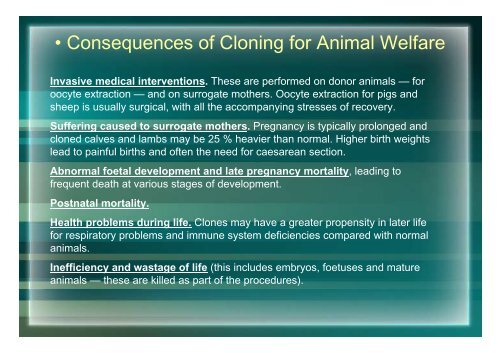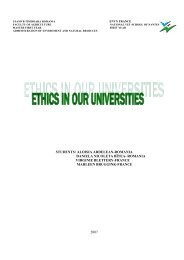Transgenic and cloned animals: Ethical problems - Agrocampus Ouest
Transgenic and cloned animals: Ethical problems - Agrocampus Ouest
Transgenic and cloned animals: Ethical problems - Agrocampus Ouest
Create successful ePaper yourself
Turn your PDF publications into a flip-book with our unique Google optimized e-Paper software.
• Consequences of Cloning for Animal Welfare<br />
Invasive medical interventions. These are performed on donor <strong>animals</strong> — for<br />
oocyte extraction — <strong>and</strong> on surrogate mothers. Oocyte extraction for pigs <strong>and</strong><br />
sheep is usually surgical, with all the accompanying stresses of recovery.<br />
Suffering caused to surrogate mothers. Pregnancy is typically prolonged <strong>and</strong><br />
<strong>cloned</strong> calves <strong>and</strong> lambs may be 25 % heavier than normal. Higher birth weights<br />
lead to painful births <strong>and</strong> often the need for caesarean section.<br />
Abnormal foetal development <strong>and</strong> late pregnancy mortality, leading to<br />
frequent death at various stages of development.<br />
Postnatal mortality.<br />
Health <strong>problems</strong> during life. Clones may have a greater propensity in later life<br />
for respiratory <strong>problems</strong> <strong>and</strong> immune system deficiencies compared with normal<br />
<strong>animals</strong>.<br />
Inefficiency <strong>and</strong> wastage of life (this includes embryos, foetuses <strong>and</strong> mature<br />
<strong>animals</strong> — these are killed as part of the procedures).



